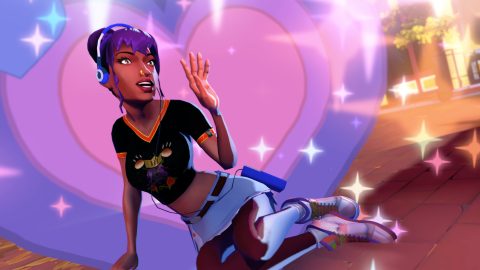
It landed in March like a cinematic grenade in the popcorn bucket of a divided America. The Hunt – a bloody slasherfest in which the ultra-woke liberal elite slaughter QAnon-style right wingers while chastising each other over patriarchal assumptions, checking their white privilege and despairing over the accidental deaths of animal “innocents”. Predictably, it caused outrage on all sides of the political spectrum. Even Trump himself decried the movie – which used the word “deplorables” for its victims – as “made in order to inflame and cause chaos” on Twitter.
The Hunt is perhaps the most pertinent example of the shift in the cultural discussion dissected in new Sky Arts documentary Offended By Irvine Welsh. Here, the Trainspotting author argues that surrendering to modern online-mob righteousness and denouncing any work – or opinion – that doesn’t toe accepted liberal lines is suffocating provocative art. Art that sets out to spotlight uncomfortable or taboo subjects in the name of progress.

He points to his 2008 novel Filth – the story of an inherently racist, homophobic and misogynistic police officer – being removed from bookstores during police raids and his 1993 debut Trainspotting from the Booker Prize list over complaints about its content. Trainspotting, he believes, would never find a willing publisher in an era terrified of stirring up a Twitterstorm.
It’s a concern I sympathise with. In 2013, I published a novel called [6666666666] which was, as the Amazon reviews correctly summarised, “relentlessly obscene”. It was a fictional world populated by sexist rock pigs, paedophile politicians and sleazy pick-up artists. It was written to offend, not for shallow shock value but to allow the reader a numb distance from the characters’ inevitable fates, evoke sympathies for the more deserving hosts and plunge you deep inside the foulest corners of humanity en route to a finale that’s intended to mess with your engrained morality.

As an exploration of some horrific – but undeniably real – aspects of the human character, I’d have no qualm in publishing it again today though, which is where Welsh’s point begins to fracture. You can still buy Filth. Nobody banned The Hunt. Outrage still sells – the worst review quotes about The Hunt were are all used on the poster, its controversy pushed as the primary selling point. Novels, films and artworks remain far more free to offend than they were when Ulysses, A Clockwork Orange or Naked Lunch fell foul of the moral censors of their age. Artists in 2020 are often only self-censored by their own fear. It’s in exploring the bravery and thick skin necessary to remain confrontational in an era where your work is liable to be scoured, strung up and demonised – and the artist along with it – that Irvine Welsh’s documentary hits its mark.
In Offended…, Welsh speaks to artists concerned about exhibiting controversial artworks that might previously have seen them lauded as subversive and transgressive pioneers, not just fearing a career-ending ‘cancel culture’ backlash but the death threats that can result. Author Nadifa Mohamed astutely puts the righteous case in favour of ‘consequence culture’: that people with the power of a voice and platform should be held responsible for their offensive views. Welsh counters with: “Witch hunting isn’t an exact science.”

Indeed, I’ve begun to envision cancel culture as a particularly rowdy Reading festival. A band, getting paid a chunky fee, plug in their 50,000 watt mikes and amps and play a dreadful song; the crowd unite to bottle them off. That’s what people think they’re doing; giving voice to the suffering voiceless. In fact, once the band has fled the stage, the mob then turns around and bottles anyone who quietly admits to liking the solo, then anyone who got a lift to the site with him, and then bottles the compere asking everyone to stop bottling those people, and keeps on bottling until all dissent is silenced. After so much failed discourse, there’s nothing left but red mist.
This is a form of ‘social justice’, Welsh argues, which thrives on inference and association, naturally equates lower class with bigotry and struggles to separate the art from its creator. “If you write about killing somebody they assume that you’ve not done that,” he tells comedian Andrew Doyle, “but as soon as you write about sex, that’s your sex life splayed out.” Doyle himself gives an example of the most worrying effect of cancel culture: an actor friend who was told by their agent that they had to tweet their support of Black Lives Matter or be dropped by the agency. “Compelled speech,” he says, “that’s a step into authoritarianism.”

Near the end of Offended…, Irvine Welsh sets himself the task of rewriting a page of Filth according to today’s values and expectations, replacing his antihero’s offensive phrases with polite, acceptable equivalents. Within a few lines, as he explains, “the character just vanished”, and no real-life racist, sexist and homophobic police officers could possibly have been shamed by it anymore. When artists begin to whitewash their art so as not to offend, they merely allow the root of that offence to fester, unseen and un-confronted. As any support group leader will tell you, we only overcome our worst failings by recognising them, however painfully, and art, cinema, comedy and fiction are our way, as a species, of standing up and publicly acknowledging our flaws. Self-censorship, and anything that enforces it, on the other hand, is just more denial.
‘Offended By Irvine Welsh’ is available now on Sky Arts
The post Irvine Welsh is right, art needs the power to offend appeared first on NME Music News, Reviews, Videos, Galleries, Tickets and Blogs | NME.COM.







